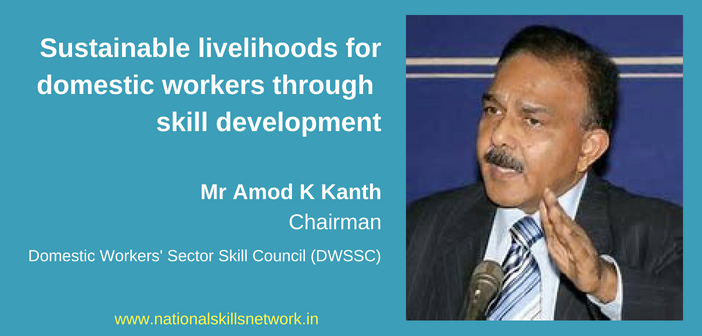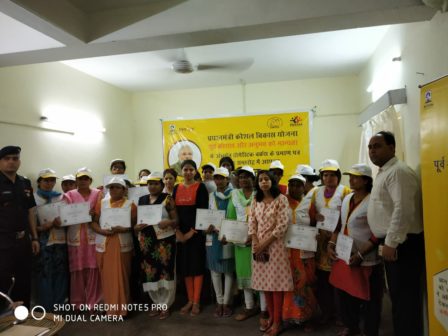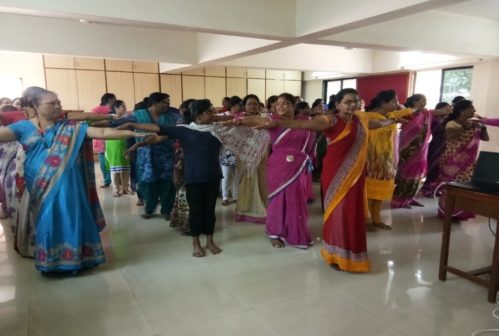Domestic workers constitute one of the largest segments of the informal workforce in India, estimated between 4.75 to 25 million approximately. This segment offers many services for individuals and families through cooking, laundry, shopping, household maintenance and as care-givers to the children, elderly, ailing, disabled. Being unskilled or semi-skilled their work is not yet recognized as a trade or a profession and often get exploited by their employers In this Skill Talk, Mr. Amod K Kanth, Chairman, Domestic Workers’ Sector Skill Council (DWSSC), tells us about the initiatives from DWSSC to improve the social dignity, financial stability and professional identity of the domestic workers (DWs).
Q: Tell us about the significance of DWSSC in improving the livelihoods of the underprivileged.
A: Let me start by saying that till the Prime Minister’s office took initiative for National Skill Development Programme in 2008, there was no policy in the country for skilling/ vocational training in different sectors. The demand of household jobs, particularly housekeeper and cook has risen at a fast pace due to economic and infra development, resulting in increase in middle class, which has shown a sharp increase of about 20% since the liberalisation of economy in 1991. This has provided jobs to the underprivileged, without undergoing skill training. While, some of the DWs may be under paid, on an average, these conditions have added to their bargaining power and market value. DWSSC provides the DWs with skill improvement training and certify them, which in turn, makes them financially confident and improve their livelihood.

Q: Why is the DW sector in India different from that abroad, essentially in SE Asia, US and Europe?
A: Current market for the DWs is entirely demand and supply driven, there are a large number of jobs and many opportunities therein. It is estimated that DWs sector accounts for upwards of 20 million with 20% growth rate. Nevertheless, market is not ready for the skilled DWs so far, and these workers are still termed as servants, and their labour a form of servitude, with caste system and traditions adding to the further limitations. Nevertheless, the conditions are changing, as the Placement Agencies have stepped in. The media and voluntary organisations have started playing active role in seeking the rights of the DWs as in other nations.
Q: What is the role of trade unions in the rights of the DWs?
A: I have observed with concern that most of the trade unions perceive the aspect of rights of the DWs in biased manner. All they see is that they are being ill-treated. They are not looking at the possibility of empowering the workers through skilling. Trade unions need to understand this aspect to empower them.
Q: What roles can the placement agencies play in enabling the DWs to get their dues from their employers? Is police verification an issue with the DWs?
 A: Bonafide role for the placement agencies shall be job placement for the DWs, and this role assumes importance. Coordination amongst stakeholders can assist the sector to get organised. In so far as the verification is concerned, to begin with, police need not treat the DWs as criminals. Their approach embarrasses the workers, and unwittingly though, is biased towards the employers. Further, employers can also get the verification done through the 3rd parties like placement agencies, DWs welfare board, trade unions etc. intervention of the placement agencies makes them responsible for safeguard of both the employers and workers.
A: Bonafide role for the placement agencies shall be job placement for the DWs, and this role assumes importance. Coordination amongst stakeholders can assist the sector to get organised. In so far as the verification is concerned, to begin with, police need not treat the DWs as criminals. Their approach embarrasses the workers, and unwittingly though, is biased towards the employers. Further, employers can also get the verification done through the 3rd parties like placement agencies, DWs welfare board, trade unions etc. intervention of the placement agencies makes them responsible for safeguard of both the employers and workers.
We have 137 training partners, who are running 164 training centres across the country to provide skills and finishing touches to a work. We are also carrying out research and designing the training with a view to keep this sector in line with the currently developing Skill Ecosystem in the country, a drive directly by Mr Narendra Modi, Prime Minister.
Q: What are the initiatives taken by the DWSSC to promote dignity of labour and awareness among employers for engaging DWs?
A: We approach RWAs and make them aware on the types of trainings and skilling we provide to the DWs and ask them to make the employers aware of the role of DWSSC to instil skills and sense of responsibility during the training. This, in the long run helps to build a better relationship between the employers and the DWs, consequently better output to the satisfaction of both the parties. We also need to have sizable funds to give regular ads through different modes of communication including the print and online media to reach out to the individual households. In future, we plan to use the mass media for educating the employers about the dignity of labour and support that is due to the DWs
 Q: Let us know about the job roles that are most in demand in the industry and how does DWSSC facilitate training in these job roles.
Q: Let us know about the job roles that are most in demand in the industry and how does DWSSC facilitate training in these job roles.
A: General Housekeeper and Housekeeper – cum – cook are top most job roles. The demand of the elderly caretakers also seems to be increasing. Recently, an amendment to the Maternity Act, seeking industry and business to establish creche is likely to increase the demand of the skilled and certified personnel in the job of the child caretaker.
Q: What are the steps taken to create awareness among these workers about skills, Recognition of Prior Learning (RPL) and other ways to improve their incomes and wages?
A: Our industry partners and the training partners make the DWs understand the value of their work and realise their potential and thereby remain informed about the value they should be getting for their work in terms of salary. Via RPL, we upskill the DWs to address the skill gaps and certify them. So far, we have trained 25677 beneficiaries which included 21715 under the PMKVY 2.0 scheme, and also includes RPL.
Q 9. What is your vision for DWSSC?
A: Over last two years of its existence (approximately), DWSSC has carried out substantial research in the job roles in the Domestic Sector. We have conceived nine job roles so far, which we are making efforts to meet the global bench mark in this sector. I also visualise that in future DWSSC shall become the databank for all DWs and their sole representative.
I am confident that over the next five years we are looking at a scenario in which majority of our domestic DWs are skilled and are hired on the basis of the certificates and knowledge they have gained through this Skill Ecosystem as envisioned by our Prime Minister.














Skilling is most necessary.Skill providers with dedicated effort can change the existing seen.